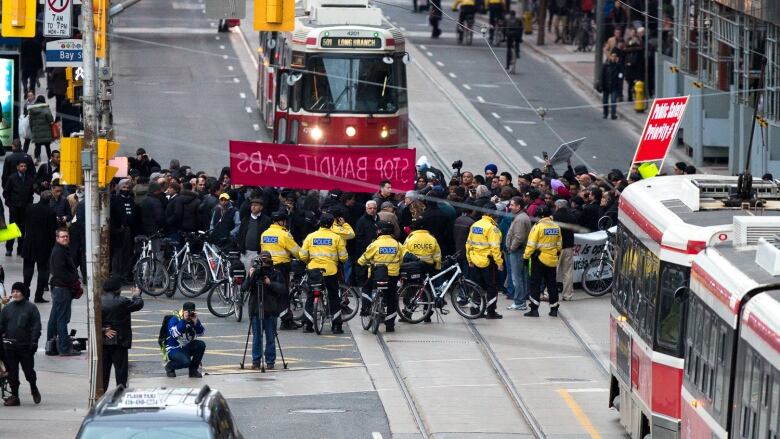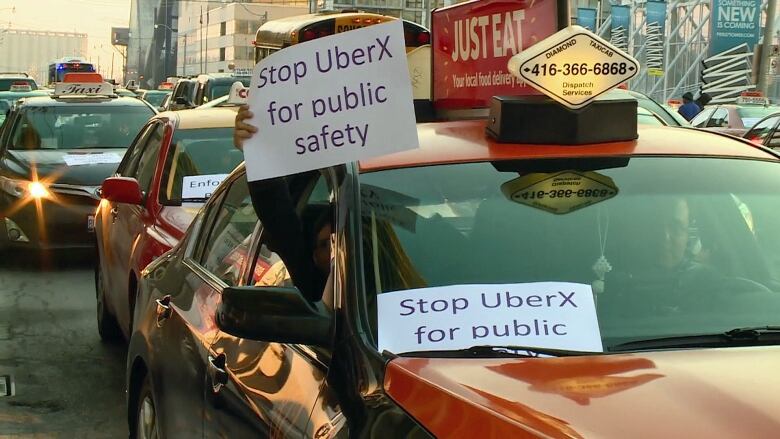Taxis likely hurting themselves, helping Uber with protests: experts
A 12-hour protest that clogged Toronto's streets this week may have done more harm than good

In the battle of tradition versus technology, who is winning war for public support?
A number of Toronto taxi drivers took the streets of Canada's largest city Wednesday, clogging streets and slowing traffic in protest of UberX, the ride-sharing app turning their industry upside down.
At one point, a protesting taxi driver was pulled metres along a roadway after trying to confront an UberX driver, pounding furiously on the window before clinging to the vehicle's mirror.
"We are trying to get a point across, that's what we're trying to do," the driver told reporters.
The shocking scene drew a lot of attention, but was it the kind the taxi industry needs?
"What we have here is pretty much mirror images in terms of brand," said Michael Mulvey, a marketing professor at the University of Ottawa who specializes in consumer behaviour.
"On one hand you have [Uber]that seems to be doing everything right on strategy," he said. "And on the other hand you have an industry that's breaking every rule in the branding, common-sense book. It's a pretty interesting case study."
Technology vs. tradition
Operating in 60 countries and 350 cities around the world, Uber launched its service in Toronto in August 2012 and has expanded to Halifax, Montreal, Ottawa, Edmonton and Quebec City.
Uber's road to success hasn't been an easy one. Globally, it has faced a range of legal battles on everything from licensing issues to labour laws to tax complaints.

Uber gets around the city's bylaws by saying it's a technology company, not a taxi service, and therefore not subject to the same rules.
Taxi drivers, on the other hand,pay thousands for their licences, must buy costly insurance policies, must undergo regular training and are governed by fares set by the city. As a result, they say, they just can't compete.
Vancouver and Calgary are among citiesthat have barred the company a move that hasn't stopped Uber from fighting for those markets, maintaining a social media presence despite having no drivers on the road.
In fact, the company held a food drive in Calgary this weekend, offering to pick up donations for the Calgary Food Bank for free an effort aimed at winning the hearts and minds of potential customers.
Other PR-savvy campaigns many cateringto local markets have included curbside breathalyzers, free rides to election polls and even on-demand puppy playdates. All are designed tobuild the brand.
Markus Giesler, a York University marketing professor who has studied Uber for about four years, says the company's brand success can be summed up in one word: empathy.

"Uber manages to extract value out of ride experiences that traditional industry players haven't kept up with," Giesler said.
Service features
Simple service features that have become standard for Uber vehicles a cleaner car, an extra-polite driver and offers of water, candies or magazines are all aimed at making the passenger feel cared for.
But as Uber established itself, Giesler said, he's seen the company's PR strategy shiftaway from"customer-centric" to an "institutionalized approach."
He calls it a form of "ideological warfare." Now that the company hasshaped consumers' perceptions, it puts pressure on law-making institutions to make the public happy.
"We've come out thinking Uber is a very forward-looking, innovative and progressive mode of transportation," he said, "while at the same time thinking about more traditional industry players as backwards, unfair and outdated."
To help paint itself as a tech disruptor taking on an outdated industry, the company brought on David Plouffethe campaign manager behind U.S. PresidentBarack Obama's successful White House bid.
In a blog post announcing Plouffe's hire in August 2014, Uber CEO Travis Kalanick was frank about needing someone to help the company "build a meaningful brand."
"Earlier this year," Kalanicksaid, "I made it a top priority for Uber to find a leader who could help cities and citizens understand the Uber mission someone who believed in our cause, who understood how to build a meaningful brand, who knew how to scale a political campaign, and who knew how to get the support on the ground to win."
Plouffe sought to spread Uber's message in Canada in September, making stops in Toronto, Montreal and Vancouver. He took the same reconciliatory tone in each market, saying Uber wants to work with municipalities to update regulations, ease gridlock and grow the proverbial economic pie by creating jobs and increasing consumer spending.
No consensus among taxi drivers
Mulvey and Giesler say the taxi industry's message isn't nearly as clear-cut.
Taxi drivers don't operate under a single banner. And although Wednesday's protests featured drivers from all walks, not everyone in the industry supported their efforts.
The Toronto Taxi Alliance issued a statement ahead of the event saying "it does not support any tactic which will disrupt traffic or transportation for Toronto drivers and residents."

Giesler suggests Uber's history as a start-up offers another strategic advantage: It is used to having to "legitimize" its business, making the company more agile in responding to brand crises.
He thought Wednesday's efforts made the taxi industry look "desperate" and "uncreative," adding the "justice" debate that the taxi industry has been pushing is likely going to fall on deaf earsbecause Uber is playing the same card, albeit in a different way.
It's become a battle between "what is a fair way to treat a driver" and "what is a fair way to create a business," he said,."The truth around whether [something]is a fair or unfair thingthat's always in the making."













_(720p).jpg)


 OFFICIAL HD MUSIC VIDEO.jpg)
.jpg)



























































































